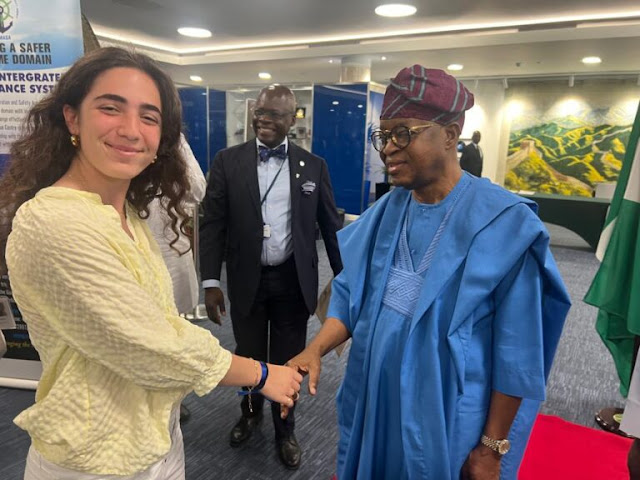In a significant move to bolster its international maritime influence, Nigeria has officially launched its campaign for re-election into Category C of the International Maritime Organization (IMO) Council. The campaign was unveiled during a high-profile event held on the sidelines of the United Nations General Assembly (UNGA) in New York, United States. The occasion, attended by global maritime stakeholders, diplomats, and industry leaders, served as a platform for Nigeria to highlight its remarkable achievements in the maritime sector and reaffirm its commitment to advancing global maritime governance, safety, and sustainability.
A Strategic Campaign Launch at the UNGA
The event, which took place in New York, marked a pivotal moment for Nigeria’s maritime diplomacy. The Nigerian delegation, led by key figures from the Federal Ministry of Marine and Blue Economy and the Nigerian Maritime Administration and Safety Agency (NIMASA), used the opportunity to articulate the country’s vision for the IMO Council and its contributions to the global maritime industry. The choice of the UNGA as the backdrop for the campaign launch underscored Nigeria’s intent to engage with a diverse and influential audience, including representatives from IMO member states, international organizations, and the private sector.
The campaign is part of Nigeria’s bid to secure re-election into Category C of the IMO Council during the organization’s General Assembly elections scheduled for December 2025 in London. Category C comprises 20 member states with special interests in maritime transport or navigation, and Nigeria has been a consistent member of this category, leveraging its strategic position as a maritime nation to contribute to global maritime policies.
Showcasing Nigeria’s Maritime Achievements
During the event, Nigeria presented a compelling case for its re-election by showcasing its strides in the maritime sector. The delegation highlighted the country’s efforts in enhancing maritime safety, security, and environmental sustainability, which align with the IMO’s core objectives. Nigeria’s achievements were presented as a testament to its readiness to continue playing a pivotal role in shaping global maritime standards.
One of the standout achievements highlighted was Nigeria’s progress in combating piracy and armed robbery at sea. The Gulf of Guinea, a critical maritime corridor, has historically been plagued by piracy, posing significant risks to international shipping. Nigeria’s Deep Blue Project, a multi-faceted initiative launched to secure its territorial waters, has yielded impressive results. The project integrates maritime assets, including surveillance systems, fast-response vessels, and air support, with collaboration from regional and international partners. Since its implementation, incidents of piracy in Nigerian waters have significantly declined, earning Nigeria commendations from the IMO and other global maritime bodies.
The delegation also emphasized Nigeria’s advancements in port infrastructure and operational efficiency. The country has invested heavily in modernizing its ports, including the Lekki Deep Seaport, which is set to become one of Africa’s most advanced maritime facilities. The port, designed to handle ultra-large container vessels, is expected to boost Nigeria’s trade capacity and position the country as a transshipment hub in West Africa. Additionally, improvements in port automation and digitalization have reduced vessel turnaround times, enhancing Nigeria’s competitiveness in global trade.
Commitment to Environmental Sustainability
Nigeria’s campaign also underscored its commitment to environmental sustainability in the maritime sector, aligning with the IMO’s focus on reducing greenhouse gas emissions and promoting eco-friendly shipping practices. The country has taken concrete steps to comply with IMO regulations, such as the International Convention for the Prevention of Pollution from Ships (MARPOL). Nigeria has implemented measures to reduce sulphur emissions from ships and promote the use of cleaner fuels, demonstrating its dedication to combating climate change and protecting marine ecosystems.
The Nigerian delegation highlighted the country’s efforts in developing its blue economy, which emphasizes sustainable use of ocean resources for economic growth. Initiatives such as mangrove restoration, coastal erosion control, and fisheries management were presented as evidence of Nigeria’s holistic approach to maritime governance. These efforts resonate with the IMO’s sustainability goals and position Nigeria as a responsible maritime nation.
Strengthening Maritime Governance and Capacity Building
Nigeria’s contributions to maritime governance were a key focus of the campaign launch. The country has been an active participant in IMO deliberations, advocating for policies that address the needs of developing nations, particularly in Africa. Nigeria has championed initiatives to enhance maritime education and training, ensuring that seafarers are equipped with the skills needed to meet global standards. The establishment of world-class maritime training institutions, such as the Maritime Academy of Nigeria in Oron, has produced thousands of skilled professionals who contribute to the global shipping industry.
Furthermore, Nigeria has been a leader in regional maritime cooperation. Through its leadership in the Maritime Organization of West and Central Africa (MOWCA), Nigeria has facilitated collaboration among member states to address common challenges, such as piracy, illegal fishing, and marine pollution. The country’s role in fostering regional integration and capacity building was presented as a key reason for its re-election to the IMO Council.
Engaging the Global Maritime Community
The New York event provided a platform for Nigeria to engage directly with IMO member states and stakeholders. The delegation held bilateral meetings with representatives from key maritime nations, seeking their support for Nigeria’s candidacy. These discussions focused on mutual interests, including maritime security, trade facilitation, and technological innovation in shipping. Nigeria’s proactive engagement with the global maritime community underscored its commitment to multilateral cooperation and its aspiration to remain a leading voice in the IMO.
The event also featured presentations from industry experts and stakeholders who highlighted Nigeria’s potential to drive innovation in the maritime sector. Topics such as digital transformation, autonomous shipping, and renewable energy in maritime operations were discussed, showcasing Nigeria’s forward-thinking approach to addressing emerging trends in the industry.
Nigeria’s Vision for the IMO Council
In its campaign, Nigeria outlined a clear vision for its role in the IMO Council. The country pledged to advocate for inclusive policies that consider the unique challenges faced by developing nations, particularly in the areas of maritime safety, security, and environmental protection. Nigeria emphasized the importance of capacity building and technology transfer to ensure that all member states can meet IMO standards and contribute to global maritime goals.
The delegation also highlighted Nigeria’s commitment to gender equality in the maritime sector. The country has implemented programs to encourage the participation of women in maritime professions, aligning with the IMO’s Women in Maritime initiative. By promoting diversity and inclusion, Nigeria aims to set an example for other nations and contribute to a more equitable global maritime industry.
Challenges and Opportunities
While Nigeria’s maritime achievements are commendable, the country faces challenges that it must address to strengthen its candidacy. Issues such as bureaucratic inefficiencies, inadequate funding for maritime projects, and the need for continuous investment in infrastructure were acknowledged during the campaign launch. However, the delegation emphasized that Nigeria is actively addressing these challenges through policy reforms, public-private partnerships, and international cooperation.
The campaign also highlighted the opportunities that Nigeria’s re-election to the IMO Council would create. As a gateway to West Africa, Nigeria’s strategic location and growing maritime capabilities position it as a critical player in global trade. By securing a seat on the IMO Council, Nigeria aims to amplify its influence and contribute to shaping policies that promote safe, secure, and sustainable shipping worldwide.
Global Support and Expectations
The New York event garnered positive feedback from attendees, with many expressing admiration for Nigeria’s progress in the maritime sector. Representatives from other IMO member states commended Nigeria’s leadership in addressing piracy and its investments in port infrastructure. The country’s proactive approach to environmental sustainability and regional cooperation was also well-received, reinforcing its credibility as a candidate for re-election.
Nigeria’s campaign team expressed optimism about securing the necessary votes at the IMO General Assembly in December 2025. The delegation called on member states to support Nigeria’s candidacy, emphasizing the country’s track record of delivering results and its unwavering commitment to the IMO’s objectives.
Conclusion
Nigeria’s launch of its IMO election campaign in New York marks a significant step in its quest to retain its seat in Category C of the IMO Council. By showcasing its achievements in maritime safety, security, infrastructure development, and environmental sustainability, Nigeria has made a compelling case for its re-election. The country’s strategic engagement with global stakeholders, commitment to regional cooperation, and vision for inclusive maritime governance position it as a strong contender.
As the December 2025 elections approach, Nigeria will continue to build on its momentum, engaging with IMO member states and reinforcing its contributions to the global maritime industry. With its rich maritime heritage, strategic location, and forward-thinking policies, Nigeria is poised to play a pivotal role in shaping the future of international shipping. The New York event has set the stage for a robust campaign, and Nigeria’s maritime aspirations are firmly on course to make a lasting impact on the global stage.






